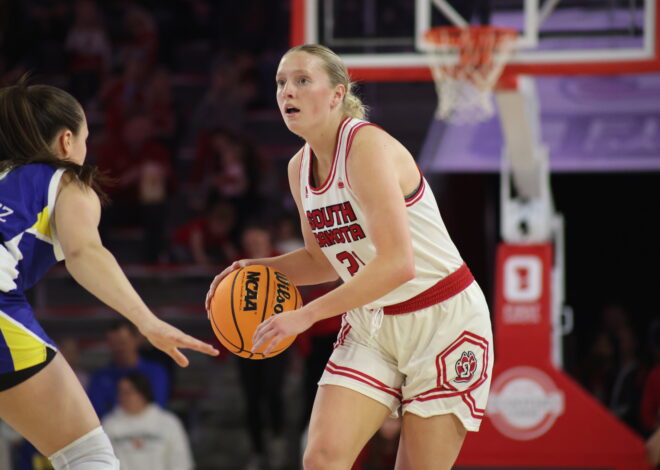Swim and dive set to be meet-free for the next month
The University of South Dakota swimming and diving team has seen a little more than half of their season go by.
Last weekend, Dec. 7-8, the men and women both finished second at the Rochester Invitational.
Sophomore long distance swimmer Morgan Barnes said despite not winning the meet, the team was very thrilled with how they performed.
“Everyone did really well. The coaches were very happy with the whole team,” Barnes said. “We had somewhere around 180 times be personal bests for our team, so that’s really good.”
Junior Colin Krysl was one of the standouts for the Coyotes. Krysl broke the school record in the 100 M Butterfly and said it was truly a special time for him.
“It was really nice to break,” Krysl said. “My freshman year I was 1/100th of a second off and then at this event last year I was 1/100th of a second off again. To finally break it was pretty awesome.”
Krysl said it was a big sigh of relief to break it before the Summit League Championships on Feb. 19.
The women now head to Omaha this Friday, but the men don’t have another meet until Jan. 17 against Morningside. With a full month off until another competition, the team will make sure to treat winter break as if noting has changed.
“We’re going to still be practicing and acting like it’s the normal part of the season,” Krysl said. “We can’t lose focus now because we know we’ve put in so much work leading up to this point.”
The team will travel to Puerto Rico Dec. 29- Jan. 7, where they will train every day and end it with an intra-squad scrimmage.
Krysl described the training done over winter break as the toughest part of all their training.
The team has put together many faster times this year, and Krysl said it’s clear they are a better team.
“We finished last in the conference last year,” Krysl said. “But we’ve been so much better this year. I have a good feeling we can do big things this time around.”
Barnes said the team has come a long way, mainly because they’ve become more comfortable with each other, which has resulted in “much faster times.”

